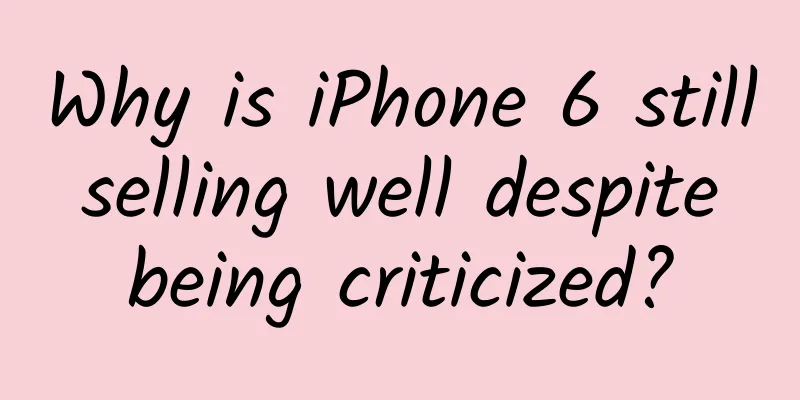Why is iPhone 6 still selling well despite being criticized?

|
It has been a while since the iPhone 6 was officially released. Since its release, there have been constant complaints about Apple's appearance imitating HTC and its large screen following Samsung. The argument that Apple's hardware technology and process innovation are weak has also continued. Industry opinion has gone from complaints about Apple's new product release to scolding Chinese scalpers for buying up the products around the world. The "bend gate" and "hair gate" have further aroused industry doubts about the iPhone 6 product itself. The news that a traffic accident not long ago caused the iPhone 6 to completely explode and burn the user has also attracted industry attention. Recently, Apple has received global attention and has its fans, but it has also been caught in the vortex of negative comments about its "lack of innovation." Some industry insiders believe that although the new iOS system has made more or less changes, it is inevitable that the industry's criticism and bad-mouthing voices are still rolling in. But the sales of iPhone 6 present a different situation. According to the regional distribution of iPhone, the sales of iPhone 6 in every country market have increased significantly compared with iPhone 5s. Among them, the United States and Europe increased by 17% and 20% respectively. The sales growth rate in Latin America and the Middle East is as high as 50%. In the Chinese market, according to media reports, nearly 20% of iPhone 6 are sold through operator subsidies, and the remaining 80% are bought by consumers at full price. Recently, due to the popularity of iPhone 6, China Unicom was in short supply and urgently replenished. In addition, some analysts said that Apple's annual sales of iPhone 6 may exceed 50 million. There is a lack of external disruptive power to leverage Apple's ecosystem model There are many reasons for this, but the most obvious reason and the consensus that the industry can basically reach is that although Apple shows signs of lack of innovation, it may still be the best mobile phone at present. Although Jobs's words "innovation is to change the world" have become a long-lasting echo, it has set the tone for Apple, that is, the iPhone has redefined mobile phones and profoundly changed people's lifestyles. Apple's unique existence as a market leader is deeply rooted in the minds of users, which is one of the reasons why Apple, which has entered mediocrity, is still highly sought after. More importantly, although Apple may not meet the fans' expectations in terms of technology and hardware innovation, there has been no disruptor in the field of smartphones that can change Apple's ecological model or make Apple's fans switch to another camp. We can see that Nokia's fall came from the innovative software and hardware integration of two giants - Apple's innovative software and hardware capabilities and the disruptive power of Google's Android open ecosystem. At that time, almost all traditional mobile phone manufacturers turned to the Android Alliance, which has a more open ecosystem and experience, while high-end users turned to the iOS system, and Symbian declined as a result. In fact, almost all the giants fell because stronger external opponents fundamentally subverted the most praised advantages and profit models of the original market leaders. At present, from China Cool Alliance Xiaomi to Samsung, HTC and Sony, they basically do not have the strength and software and hardware innovation capabilities to challenge Apple. Under the influence of Moore's Law, the hardware of smart phones has developed to the top. After the hardware advantages of Samsung, Apple's only challenger, were weakened, its profits have declined for three consecutive quarters this year. The weakness of the only competitor has made Apple's brand premium in the high-end market more prominent. We also see that the entire smartphone market has almost reached a bottleneck in terms of technological innovation. Therefore, as long as there is no better software ecosystem model and hardware process innovation that can surpass Apple, Apple will still firmly capture the high-end market mobile phone users. iOS has the upper hand in the system competition: Android has cultivated the habit of using smartphones, and some users have switched to Apple As mentioned earlier, when Jobs said that the iPhone reinvented the mobile phone, it was not because Apple completely overturned previous mobile phones, but because Apple pushed the touch screen experience of smart phones to a peak for the first time. Secondly, the application ecosystem created changed the application software usage habits and entertainment experience of mobile phone users. The hardware, appearance and iOS system application experience of the iPhone are almost completely reflected in the followers and imitators - Android. The Android prototype we saw later was not much different from the later iPhone full touch screen machine. We can also understand the anger expressed by Jobs when he claimed to destroy Android. But in fact, although the Android camp continues to grow, there is a basically agreed point of view that Android may still not be able to compare with iOS in terms of system experience. Because relatively speaking, the adaptation of the new Android system by manufacturers in the Android camp involves the cooperation of different manufacturers, the adaptation of different models and the requirements of different system resources, which in turn causes the differentiation and experience differences of the Android system. Apple's closed hardware and software integrated ecosystem can upgrade and adapt the iPhone phone to a unified system, and strictly review the online APP to ensure safety, which is also an important aspect to ensure the simplicity and excellent experience of the iOS system. This also brought about a change. At the time when smartphones were rising and developing, low-income user groups may be forced by economic conditions to switch from feature phones and keyboard phones to full-touch screen smartphones in order to experience the revolutionary and innovative experience of smartphones. At that time, Android phones could also experience the touch screen and innovative experience similar to Apple, and at the same time, they were more cost-effective, so some users would choose Android. But at present, mobile phone users' habits of using smartphones have been fully mature. At the same time, some users have lost patience with various bad experiences such as software and system compatibility issues, freezes, frequent pop-up ads, and malicious programs on Android phones. A user once commented on the author's article and said that he switched from Samsung to Apple not for the hardware of the iPhone, but for the iOS system. He was not disappointed with Samsung, but disappointed with the Android system experience, so he began to be willing to try Apple. This may represent the voice of some users who switched from Android to iOS. Another factor is the overall increase in national income. The price of Apple's mobile phones is no longer a high number for many users in the Android camp. Due to various factors, users' demand for iPhone phones reached a peak at the time of iPhone 6's release, and the sales growth of iPhone 6 was a natural result. Overall, iPhone 6 and Android phones are not competing on the same level. From another perspective, we can see that although Android phones now occupy almost 80% of the market share. But in fact, Apple's market share in the high-end market has not been affected. Because in the final analysis, Apple and Android phones are almost not competing for users at the same level. Apple wants to circle the users in the high-end market, while most Android phone manufacturers are fighting in the mid-to-low-end market. Therefore, the changes in the market share of mobile phone manufacturers are more changes in the Android camp, and the most fierce competition also occurs in the mid-to-low-end market in the Android camp. iPhone phones and the entire Android system phones are roughly on two different parallel lines. Even in Samsung's most glorious moment, only a few large-screen high-end phones from Samsung's Galaxy S series and Note series could snatch food from Apple with difficulty. Now, after the launch of iPhone 6 Plus, Samsung's advantage in the high-end market has been intercepted. Let's look back again, why did all the traditional mobile phone manufacturers choose to join the Android camp instead of Nokia's Symbian system? Because essentially, Nokia's main user groups are all high-end, medium-end and low-end user fields, and the mainstream user groups are still medium-end and low-end users. Nokia attempted to rely on the Symbian system to circle all traditional mobile phone manufacturers and dominate the world, but this was a direct enemy of all medium-end and low-end traditional manufacturers. Google launched the Android open operating system, but did not get involved in the mobile phone hardware manufacturing industry. It did not have a direct market conflict with traditional manufacturers and was relatively more neutral. It was obvious that traditional manufacturers who lacked operating system advantages chose the Android system. Apple, on the other hand, was more dazzling in terms of technological innovation and fashion technology. It relied on the excellent iOS experience to circle users and a large number of application developers in the high-end market and survived effectively. When low-end and medium-end users turned to Android, high-end users turned to iOS, and application developers made the same choice, it was reasonable for Nokia to decline. Therefore, it can be seen that Apple's fashionable technology and clear high-end market positioning ensure its high profits and avoid the fierce competition in the mid- and low-end markets. Judging from the current situation, Samsung is very likely to slide into the mid- and low-end markets and compete with Xiaomi. Therefore, it can be said that in the high-end market, if there is no ecological model and technological innovation advantage that can surpass Apple, Apple can basically hold its own cake firmly. At the same time, as national income gradually increases, there are more and more mid- and low-end users entering the iOS field from the Android camp. From the above analysis, it can be seen that iOS has always been an extremely effective trump card for Apple to maintain its core competitiveness. This is the internal factor that allows mediocre Apple to maintain continuous sales growth. In addition, we can find some other reasons, such as the more open and personalized post-90s and post-00s are more in pursuit of fashion technology than the post-80s, and many children from middle-class families in Europe, America and even China have been exposed to Apple's hardware devices at an early age, and have a higher awareness and brand sentiment towards Apple products. These are Apple's future users, and they are also users that Apple finds difficult to please. Apple's advantage is that it has cultivated the future generation's feelings for the Apple brand, but it must also continue to innovate to please the personalized needs of future users. Whether Apple's sales growth today is a flash in the pan or a harbinger of better prospects for Apple in the future, it is hard to say, but Apple, which is currently considered by the industry to have fallen into the "innovator's dilemma", must have new highlights in the future to meet consumer expectations. There is a point that I still reiterate here, that is, the hardware of the iPhone series of mobile phones is the cornerstone of the entire building that supports the Apple brand and the integrated software and hardware ecosystem layout. Apple, which already has 500 million hardware users, can be said to have a user base that connects everything. However, whether it is CarPlay that connects to cars, Healthkit that "connects to health", or Homekit that connects to home devices, although iOS is Apple's trump card to maintain its core competitiveness, the basis for Apple to connect everything lies in the future sales of iPhone hardware. In the future, the hardware of the iPhone series of mobile phones can only ensure the effectiveness of Apple's integrated software and hardware ecosystem layout with iOS as the core if it can still attract enough users. This depends on whether Apple can effectively control future users and needs. And Apple's genes determine that continuous innovation capabilities will allow Apple to go further in the future. As a winner of Toutiao's Qingyun Plan and Baijiahao's Bai+ Plan, the 2019 Baidu Digital Author of the Year, the Baijiahao's Most Popular Author in the Technology Field, the 2019 Sogou Technology and Culture Author, and the 2021 Baijiahao Quarterly Influential Creator, he has won many awards, including the 2013 Sohu Best Industry Media Person, the 2015 China New Media Entrepreneurship Competition Beijing Third Place, the 2015 Guangmang Experience Award, the 2015 China New Media Entrepreneurship Competition Finals Third Place, and the 2018 Baidu Dynamic Annual Powerful Celebrity. |
<<: How big is the intellectual property gap between Xiaomi, Meizu and Apple?
>>: Pride and Prejudice: Luo Yonghao's slap in the face and Hammer's return to the ground
Recommend
How to use fastboot to flash the original image to Android
If your phone has an unlocked bootloader, you can...
It’s the Spring Festival operation node again. Let’s talk about how event operations can attract traffic and promote activity?
Event operations usually involve attracting traff...
APICloud launches the "100 million yuan profit sharing plan", and the API ecosystem realizes the full integration of mobile development technologies
【Quick reading, article summary】 As a leading API...
How to completely complete a Weibo event promotion?
As we all know, a good event operation can often ...
How do smart home appliances eliminate the "gap" between products and users?
To this day, there is still no clear definition o...
SEIA: U.S. solar installed capacity is expected to reach 324 GW by 2023
A report jointly released by the Solar Energy Ind...
Family! Microwave ovens can really cook, and they are healthier than boiling water
Nowadays, various popular small household applian...
The stove ignited the quilt, 13 people were trapped! How to prevent safety when heating in winter?
Evening of December 27 A fire broke out in a resi...
Dyeing the lake pink! It’s for science…丨Environmental Trumpet
Hello everyone, this is the 18th issue of the Env...
Another breakthrough in AI! Identifying children's "invisible killer" before the age of 1, with an accuracy rate of over 80%
Autism is becoming the "invisible killer&quo...
From 10,000+ global user reviews, I found these 6 points
Do you think that user reviews of apps are valuab...
How to increase followers through Luckin Coffee’s coupon event!
Will Luckin Coffee become the next ofo? Luckin Co...
3 concepts for practical data analysis and decision-making!
The new graduates have a good understanding of th...
Android bottom navigation bar implementation (Part 2) RadioGroup
Here is a brief record of the implementation of t...
Challenges facing humanity: Increasingly invasive species
Produced by: Science Popularization China Produce...









